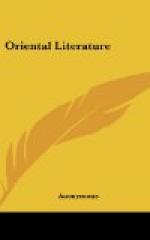The following morning Shidoub killed twenty of the camels he had won the day before, and caused the meat to be distributed among the widows and those who had been wounded and crippled in war. He slaughtered twenty others, which he used in entertaining the tribe of Abs, including women and slaves. Finally, the next day, he killed the rest of the camels and made a great feast near the lake Zatalirsad, to which he invited the sons of King Zoheir and his noblest chieftains. At the end of this banquet, when the wine circulated among the guests, all praised the behavior of Shidoub. But the news of the camel slaughter and of all the feasting was soon known to the tribe of Fazarah. All the enraged tribesmen hastened to seek Hadifah. “What,” said they, “while we were first in the race, slaves and traitorous Absians have eaten our camels! Send for an equal number of camels, by all means; but if he refuses them let us make a terrible war upon the Absians.”
Hadifah raised his eyes upon his son Abou-Firacah. “Mount horse at once,” he said to him, “and go and say to Cais: my father says that you must this instant pay the wager, or he will come and seize the amount by main force, and will bring trouble upon you.” There was then present a chief among the sheiks, who, hearing the order that Hadifah had given to his son, said: “O Hadifah, are you not ashamed to send such a message to the tribe of the Absians? Are they not our kindred and allies? Does this proposal harmonize with the counsel and desire of allaying dissensions? The genuine man shows gratitude for generosity and kindness. I think it quite reasonable to expect that you desist from this perverse mood, which will end in our total extermination. Cais has shown himself quite impartial and has done wrong to no one; cherish, therefore, peace with the horsemen of the tribe of Abs. Take warning from what happened to the slave Dames; he struck Dahir, the horse of King Cais, and God punished him at once; he is left bathed in his slavish blood. I beg you to listen to none but wise counsels; act nobly, and abandon base designs. While you are thus forewarned as to your situation, keep a prudent eye on your affairs.” This discourse rendered Hadifah furious. “Contemptible sheik! Dog of a traitor!” he exclaimed. “What! Must I be in fear of Cais and the whole tribe of the Absians? By the faith of an Arab, I will let all men of honor know that if Cais




